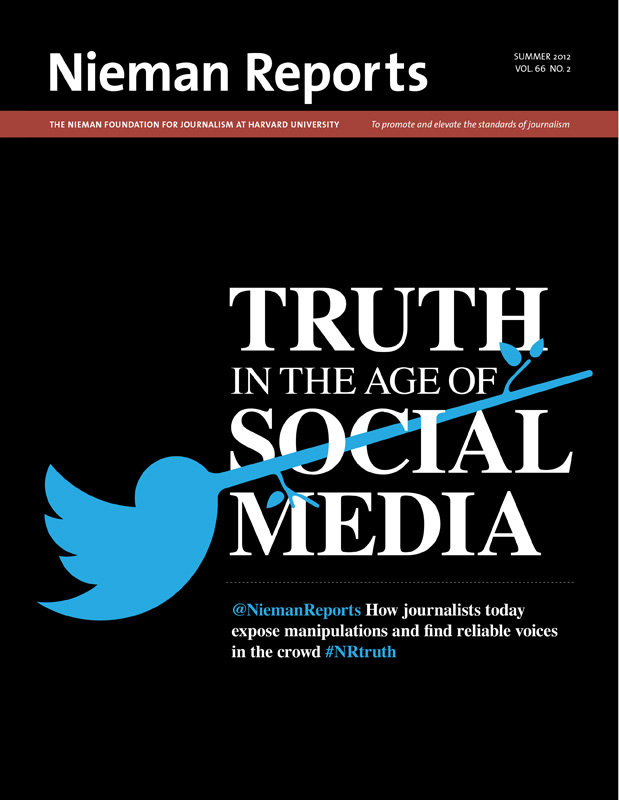
When J. Andrew Curliss investigated a district attorney, she attacked his work and his paper. Photo by Lisa Abitbol.
To say that the subject of reporter J. Andrew Curliss’s “Twisted Truth” series was difficult is putting it mildly. Tracey Cline, the district attorney of Durham, North Carolina, repeatedly battled Curliss and his paper, The News & Observer in Raleigh, over the investigation.
The three-part series is the 2011 winner of the Taylor Family Award for Fairness in Newspapers. Speaking about it, judge Tyler Bridges, NF ’12, said “what especially stood out for me was how the newspaper handled Cline’s attempts to discredit its work and that of its reporter … The paper’s editors demonstrated considerable fairness when Cline cast the paper in the difficult role of having to report on her attacks against it.” She has since been removed from office.
Nieman Reports’s Jonathan Seitz spoke with Curliss after the award ceremony. Edited excerpts of their conversation follow; a longer version is also available.
Jonathan Seitz: What led you to the “Twisted Truth” investigation?
J. Andrew Curliss: It was me sitting in the courtroom, paying attention. There was a hearing where the D.A. ended up on the stand and was asked a series of questions and clearly did not handle the questions well. My paper was the only one who covered that hearing, but on the same floor, basically across the hall, the news media for the entire region were covering a murder trial. If everybody else was sitting in the same courtroom, would they have seen what I did and decide to go look? Who knows. But part of doing good work, in my view, is seeing things happen. It’s not just sources and records and all of that.
I was covering that hearing as part of my follow-up to another series my paper had done. I could have just wrote the story, “Oh, here’s the case. It got dismissed.” But as I was sitting there and seeing what I witnessed, my mindset was “God, there’s more to this,” you know? And the “more to it” was about the D.A.
What are your go-to techniques for interviewing?
When I’m interviewing somebody, I’m thinking about two things. One is, whatever I’m asking them about, how might I describe it in the paper? Let’s say that I’m going to describe some fund as a slush fund, right? Well, if I’m going to write the words “slush fund” in the newspaper, I want to make sure that I say that in the interview. I want to ask them, “Is this a slush fund?” The other is that I’m trying to listen. I think a lot of times we can just get so focused on, “I’ve got this list of questions I’ve got to get through, one to 10,” and you don’t really listen to the answers. Maybe you’re on question three, and it could lead you in a whole new direction—if you were just listening.
The other thing I’m trying to do—I’ll just be honest here: I’m trying to shut up. I tape a lot of my interviews and I go back and I’m listening to it and I’m just, like, “Would you just shut up?” You know? And so—that’s one of the things that I’m really trying to do: ask short questions, and then be quiet.
How do you go about recreating the particulars of a case?
As a case goes up through the appeals process, things can get distilled,and in the distillation, there can be distortion. And so, as much as possible, I tried to rely on the actual trial transcripts.
What happens is that one side is arguing their point really hard, and the other side is arguing their point really hard, and sometimes the appeals court just adopts one side of it—when it’s more nuanced than that. You might think in a court story like this that it’s like, “Oh wow! This is all just sitting there in the court records.” Well, I wish it were that easy. You can’t just ask, “Oh, can I pull the file for the cases where the prosecutor’s work was questioned?” I mean, that’s the work, and there is no central file for that.
You told the district attorney early on that she was the focus of your investigation and shared your findings with her. Is that how you always operate?
Yeah, on a story like that, I think it’s helpful to try to get to the focus of the story as early as possible—“as possible” being the key words. I mean, you have to know what you want to ask them. But part of being fair is giving the person a chance to properly explain himself or herself. This notion of just showing up at the courthouse on Friday before a story’s going to run on Sunday and catching them where they can’t really explain their position—I just don’t think that’s the right way to do it. I don’t want to catch them; I want their best.
And I want their best because that’s what gets you to the truth. When you’re balancing the value of “Ooh, I caught them in a moment and they couldn’t explain this” or “I surprised them,” the surprise factor, to me, doesn’t outweigh the fairness factor. I guess that’s the bottom line.



